Please find our most recent market review below. We hope these perspectives are valuable to you.
– The AdvicePeriod Team
Running of the Bulls
The U.S. stock market continued to power forward in July with solid gains across the board while the U.S. economy continued to surprise to the upside through the first seven months of the year. Bonds were relatively flat as inflation continued to moderate. International stocks have outperformed U.S. equities over the past 12 months despite weak economic results across Europe. The Federal Reserve raised interest rates to a 22-year high but said it was too soon to tell whether the hike would conclude a series of increases aimed at cooling the economy and bringing down inflation.
Key Observations
- The stock market posted solid gains in July, with the S&P 500 up more than 20% year to date.
- Small-cap and mid-cap stocks outperformed in July, playing catch-up with large tech companies.
- Bonds ended the month flat but are still up 2% for the year.
- International developed and emerging markets gained in July despite weak economic data.
Market Recap
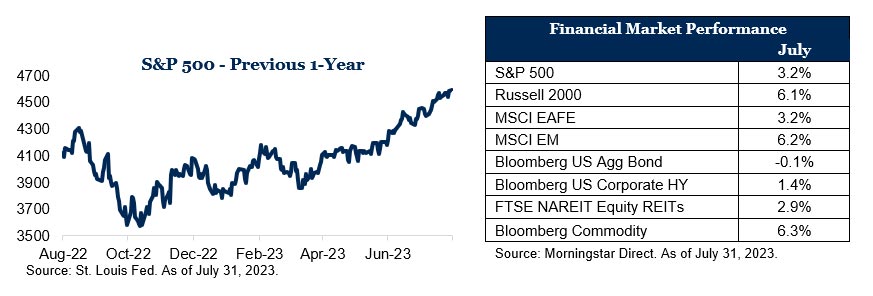
The stock market rallied in July, led by the energy, materials and communications sectors as the rally began to broaden out. The S&P 500 is up over 20% year to date, supported by better-than-expected data on the economy and falling inflation. The Bloomberg U.S. Aggregate Bond Index was flat for the month, while 10-year Treasury yields increased. Yields on the 2-year Treasury were flat for the quarter, starting and ending at 4.90% but dropping to 4.60% on July 12. The 10-year Treasury yield rose from 3.84% to 4.02%. High-yield bonds were up 1.4%, outperforming core bonds. Small- and mid-cap stocks rose 6.12% and 3.97%, respectively, as fears of recession receded. International markets ended the month with solid gains as the U.S. dollar fell.
U.S. Inflation Continues to Fall
Inflation cooled in June to its slowest pace in more than two years, giving Americans relief and raising the chances that the Federal Reserve will stop raising interest rates. The Consumer Price Index climbed 3% in June from a year earlier, the Labor Department said, sharply lower than the recent peak inflation rate of 9.1% in June 2022. The June rate declined from 4% in May. Consumers paid less in June for used cars and airline fares, and their rent increased at the slowest one-month pace since early 2022.
The U.S. economy grew solidly last quarter and remained well clear of recession despite the Federal Reserve’s aggressive rate-hiking campaign. Gross domestic product grew at a seasonally and inflation-adjusted annual rate of 2.4% in the second quarter, picking up slightly from 2% growth in the first three months of the year, according to the Commerce Department. Consumer spending grew this spring but at a slower pace for both goods and services. Business investment strengthened from April through June, with companies spending at a good pace on buildings and equipment. Overall, the GDP report suggests the economy remains resilient while the labor market remains tight. Economists are now reducing their recession expectations after so many had projected a downturn that would start in the middle of the year.
Hiring slowed in June but wages rose, and the unemployment rate fell. U.S. employers added 209,000 workers in June, a solid monthly gain but down from May’s revised 306,000. In the first half of this year, payrolls grew by an average of 278,000 a month, down from nearly 400,000 last year. The unemployment rate fell to 3.6% last month from 3.7% in May. Average hourly earnings grew 4.4% in June from a year earlier, matching gains in the preceding two months and remaining well above the pre-pandemic pace.
The generals are leading, will the soldiers follow?
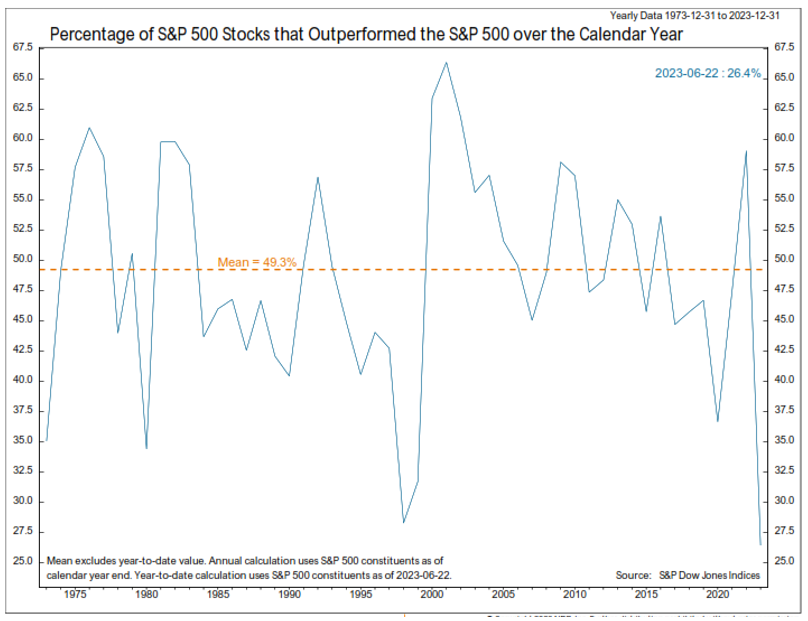
Source: Ned Davis Research. As of July 27, 2023.
The overarching theme for the stock market in 2023 has been the strong performance of a small number of large technology stocks including Microsoft Corp., Alphabet Inc., Amazon.com Inc., Meta Platforms Inc., Nvidia Corp. and Tesla Inc. By some measures, the narrowness of the rally has reached historic proportions. The five largest stocks in the S&P 500 account for 24.7% of the Index, a record high dating back to 1972. Year to date, 24.5% of stocks have outperformed the Index. If this trend holds through the end of the year, it would be the lowest percent outperforming the Index on record, dating back to 1973 (see chart above). According to Ned Davis Research, following previous periods of narrow leadership, small-cap stocks, value stocks and high-quality stocks outperform a year later. We’re not market timers, but the study does point out the importance of diversification. We think it is a mistake in this market to add to your “winners” and sell your “losers.” Market cycles turn, though no one can predict when that will happen. The study also points out the importance of active investors owning a variety of different asset classes and manager “styles” in your portfolio. With so many exciting new developments relating to artificial intelligence (AI), the rally in big tech may continue, but a prudent investor must always keep an eye on managing risk in addition to earning competitive returns.
Outlook
Consumers, businesses and economists are feeling more optimistic about the outlook. As inflation falls from historic highs, financial markets are responding enthusiastically as investors who were on the sidelines are coming back into the market. Economic growth in the U.S. and globally this year is likely to be stronger than previously estimated, according to the International Monetary Fund. The improved outlook reflects labor market strength, strong spending on services and diminished financial risks. Of course, the mood on Wall Street can change very quickly. This is why it is important to understand the investments you own and why you own them. Owning quality investments and diversifying your portfolio are the two best ways to protect yourself from market volatility.
Disclosures:
This market commentary is meant for informational and educational purposes only and does not consider any individual personal considerations. As such, the information contained herein is not intended to be personal investment advice or recommendation. References to specific companies, asset classes, and financial markets are for illustrative purposes only. Diversification is an investment strategy designed to help manage risk but cannot ensure a profit or protect against loss in a declining market. Please consult a financial professional before making any financial-related decisions.
The commentary represents an assessment of the market environment through July 2023. The views and opinions expressed may change based on the market or other conditions. The forward-looking statements are based on certain assumptions, but there can be no assurance that forward-looking statements will materialize. This commentary was written and provided by an unaffiliated third party; we cannot guarantee the accuracy or completeness of any statements or data contained herein.
Indexes are unmanaged and cannot be directly invested into. Past performance is no indication of future results. Investing involves risk and the potential to lose principal.
AdvicePeriod is another business name and brand utilized by both Mariner, LLC and Mariner Platform Solutions, LLC, each of which is an SEC registered investment adviser. Registration of an investment adviser does not imply a certain level of skill or training. Each firm is in compliance with the current notice filing requirements imposed upon SEC registered investment advisers by those states in which each firm maintains clients. Each firm may only transact business in those states in which it is notice filed or qualifies for an exemption or exclusion from notice filing requirements. Any subsequent, direct communication by an advisor with a prospective client shall be conducted by a representative that is either registered or qualifies for an exemption or exclusion from registration in the state where the prospective client resides. For additional information about Mariner, LLC or Mariner Platform Solutions, LLC, including fees and services, please contact us utilizing the contact information provided herein or refer to the Investment Adviser Public Disclosure website (www.adviserinfo.sec.gov). Please read the disclosure statement carefully before you invest or send money.
For additional information as to which entity your adviser is registered as an investment adviser representative, please refer to the Investment Adviser Public Disclosure website (www.adviserinfo.sec.gov) or the Form ADV 2B provided to you. Investment adviser representatives of Mariner, LLC dba Mariner Wealth Advisors and dba AdvicePeriod are generally employed by Mariner Wealth Advisors, LLC. Investment adviser representatives of Mariner Platform Solutions, LLC dba AdvicePeriod, are independent contractors.
Index Definitions: The S&P 500 is a capitalization-weighted index designed to measure the performance of the broad domestic economy through changes in the aggregate market value of 500 stocks representing all major industries. Russell 2000 consists of the 2,000 smallest U.S. companies in the Russell 3000 index. MSCI EAFE is an equity index which captures large and mid-cap representation across Developed Markets countries around the world, excluding the U.S. and Canada. The index covers approximately 85% of the free float-adjusted market capitalization in each country. MSCI Emerging Markets captures large and mid-cap representation across Emerging Markets countries. The index covers approximately 85% of the free-float adjusted market capitalization in each country. Bloomberg U.S. Aggregate Index covers the U.S. investment grade fixed rate bond market, with index components for government and corporate securities, mortgage pass-through securities, and asset-backed securities. Bloomberg U.S. Corporate High Yield Index covers the universe of fixed rate, non-investment grade debt. Eurobonds and debt issues from countries designated as emerging markets (sovereign rating of Baa1/BBB+/BBB+ and below using the middle of Moody’s, S&P, and Fitch) are excluded, but Canadian and global bonds (SEC registered) of issuers in non-EMG countries are included. FTSE NAREIT Equity REITs Index contains all Equity REITs not designed as Timber REITs or Infrastructure REITs. Bloomberg Commodity Index is calculated on an excess return basis and reflects commodity futures price movements. The index rebalances annually weighted 2/3 by trading volume, and 1/3 by world production and weight-caps are applied at the commodity, sector, and group level for diversification.
Does past performance matter?
Major Market Index Returns
Period Ending 8/1/2023
Multi-year returns are annualized.
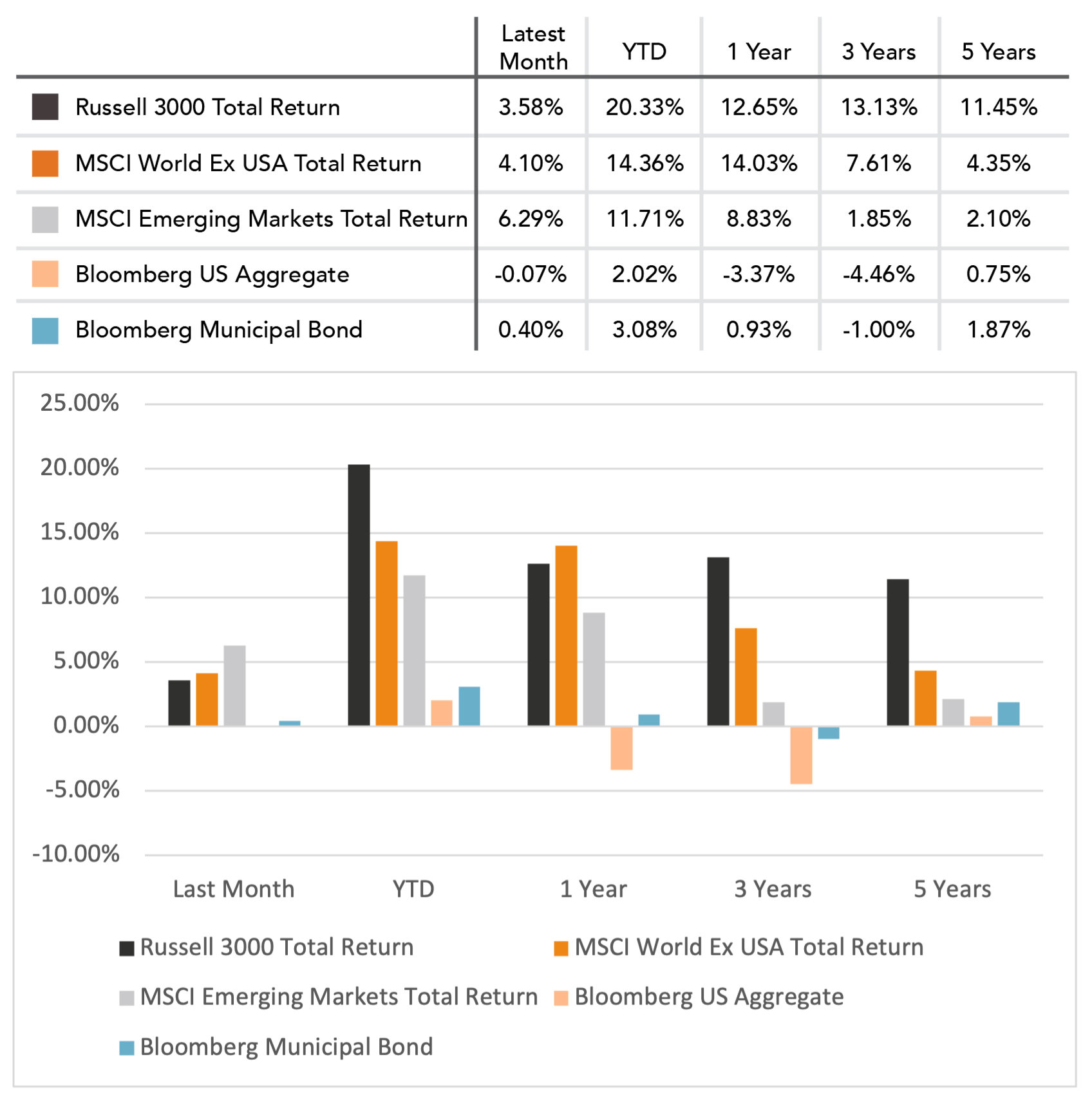
Mix Index Returns
Global Equity / US Taxable Bonds
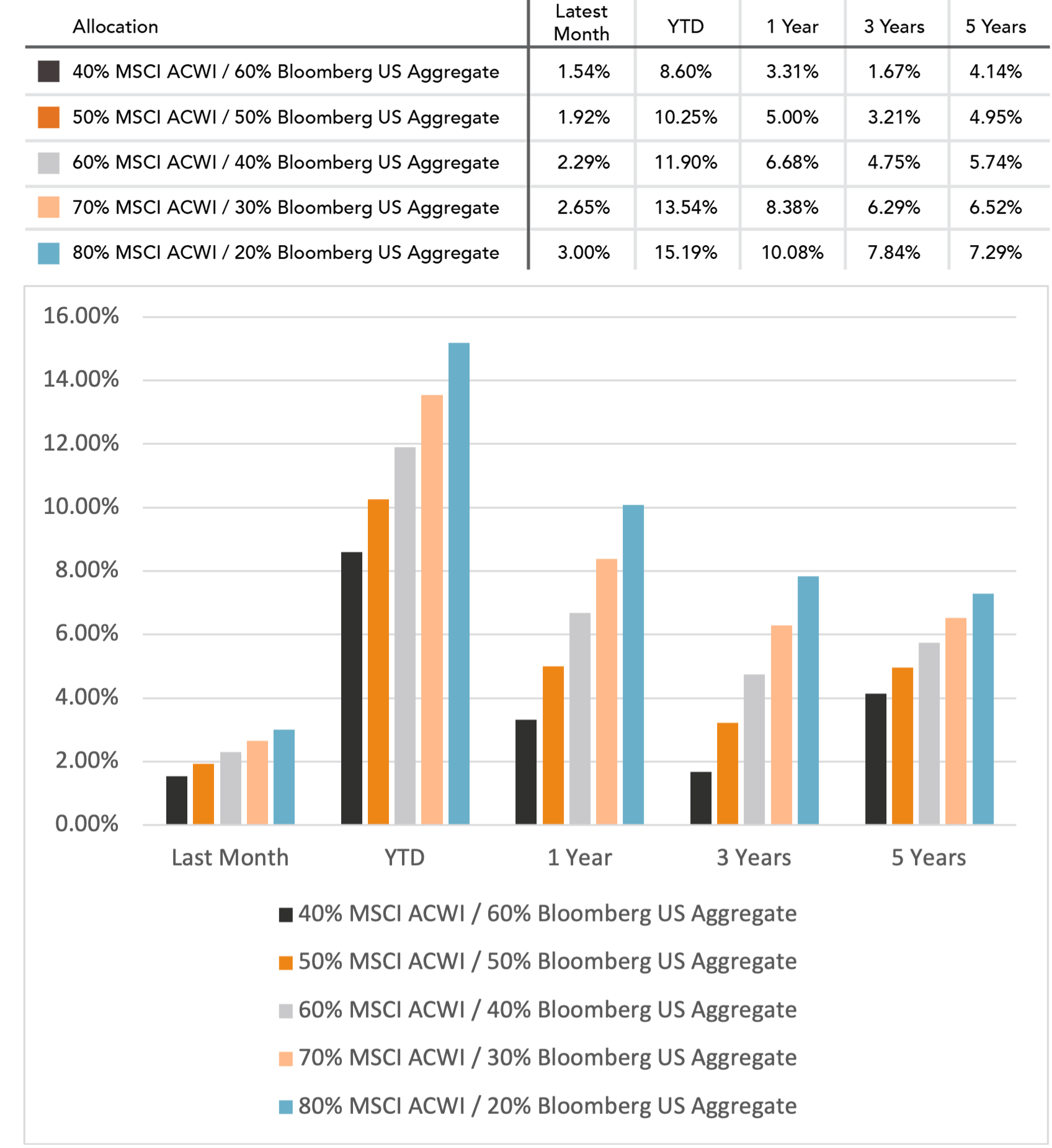
Indexes are unmanaged and cannot be directly invested into. Past performance is no indication of future results. Investing involves risk and the potential to lose principal.
The Russell 3000 Index is a United States market index that tracks the 3000 largest companies. MSCI Emerging Markets Index is a broad market cap-weighted Index showing the performance of equities across 23 emerging market countries defined as emerging markets by MSCI. MSCI ACWI ex-U.S. Index is a free-float adjusted market capitalization-weighted index that is designed to measure the equity market performance of developed and emerging markets excluding companies based in the United States. Bloomberg U.S. Aggregate Bond Index represents the investment-grade, U.S. dollar-denominated, fixed-rate taxable bond market, including Treasuries, government-related and corporate securities, as well as mortgage and asset-backed securities. Bloomberg Municipal Index is the US Municipal Index that covers the US dollar-denominated long-term tax-exempt bond market. The index has four main sectors: state and local general obligation bonds, revenue bonds, insured bonds, and prerefunded bonds.

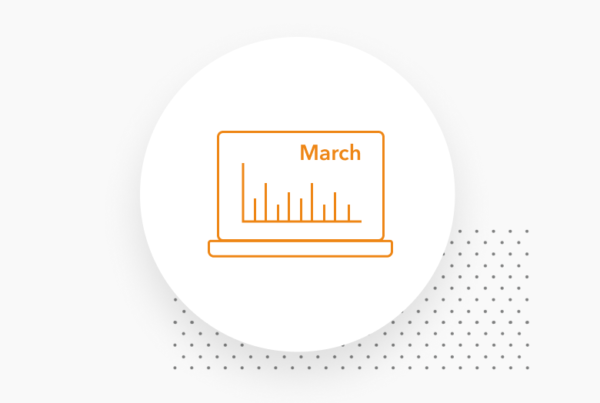


April 2024 Market Commentary